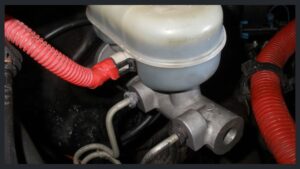
5 Symptoms of a Brake Fluid Leak
You can’t drive a vehicle without your brakes working properly. If your braking system fails, a brake fluid leak is very likely to be the cause.
There are four places in your brake system where a leak can occur. It could be the master cylinder, the front brake caliper, the brake lines, or the rear brake caliper.
Regardless of where the leak is coming from, the symptoms of a brake fluid leak should make it easy to identify the problem.
Common Symptoms of a Brake Fluid Leak
1) Warning Light
The first symptom you should notice is the brake warning light on your dashboard coming on. At this point, you may not even feel like you have a serious braking problem.
However, if the warning light comes on, you should stop and get it checked immediately, as it is an early sign that you have a brake problem.
2) Strange Feeling of the Brake Pedal
Only put brake fluid in your brake lines. If you have a brake fluid leak and air gets mixed with the fluid in your brake lines, the fluid will not flow properly. So when you press your foot on the brake pedal, you get a squishy or spongy feeling. In other words, the brake pedal feels very soft.
3) Brake pedal goes down too low
This problem relates to the second one on this list. If air continues to enter the brake lines despite the leak, airborne contaminants are getting into the braking system. Additionally, condensation will start to form and eventually the brake pedal will move all the way down when you press it. After repairing the leak, you should “bleed” your brakes to remove the air from the brake lines and replace all the old brake fluid with new.
4) Visible Fluid Leak
If you have fluid leaking from under your car (especially around the wheels) and you have already noticed any of the first three symptoms, you definitely have a brake fluid leak.
Stop immediately and check your brake fluid levels, then drive to a mechanic right away (depending on the severity of the leak) or have your vehicle towed. The more fluid that leaks, the less fluid there is in the brake system, and the more dangerous it becomes.
5) Your car won’t stop
You will definitely experience the worst possible symptoms. You shouldn’t get to this point without noticing the previous symptoms first. However, if you ignore these symptoms, you can expect that at some point your brakes will fail completely.
And you’ll end up driving your car without stopping. Of course, this can lead to a car accident, damaging your vehicle and causing serious or worse injuries.

